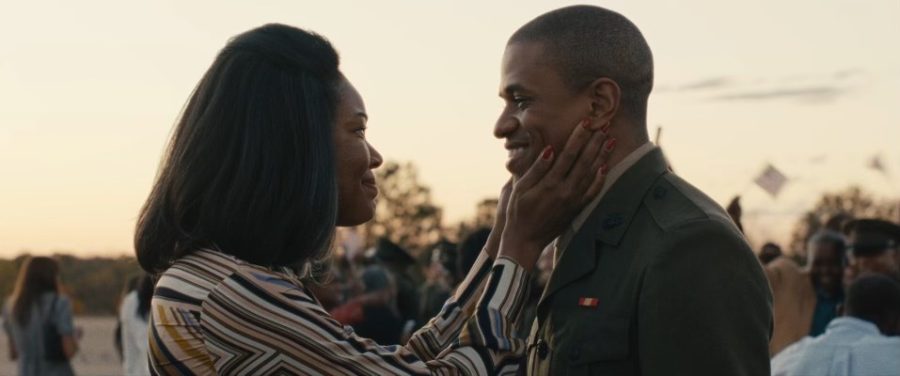‘The Inspection’ shows at Austin Film Festival, centers Black queer man as film’s hero
October 31, 2022
Sporting a silver hat embossed with the Telfar logo and black platform boots, Elegance Bratton describes himself as a Frankensteinian assemblage — a mixture of Beyoncé choreography and how Karl Lagerfeld uses chopsticks.
However, Bratton said the movie screen often sews him into something far less authentic.
“It’s very rare Black queer men get to be the hero of the story,” Bratton said. “Most times, we’re like the handbag — the accessory to the lead.”
In his feature film directorial debut, Bratton looked to subvert this trope. A24’s “The Inspection” follows Ellis French (Jeremy Pope), a Black gay man who joins the Marines after his mother, Inez French (Gabrielle Union), rejects him. Largely based on Bratton’s life, the film showed at Austin Film Festival on Saturday, accompanied by a panel featuring Bratton and Raúl Castillo, who plays Rosales, a drill instructor who takes French under his wing.
With his film coming to theaters Nov. 18, Bratton wears both hats of writer and director to create a story about a Black gay man by a Black gay man. Bratton said while making the film, he envisioned all of America watching in the movie theater, bearing witness to an example of Black LGBTQ+ excellence from which future generations can draw strength and power.
“This is like a gay, Black ‘Rocky,’” Bratton said. “This is about a man who’s willing to do anything to win the love of his mother, but ultimately, during a hellish process, learns to respect themselves. It’s a universal story that anyone can see themselves in.”
Meeting Bratton around 2019, radio-television-film associate professor PJ Raval said they both remain in the same realm within the film world as LGBTQ+ filmmakers of color. Attending Bratton’s screening and panel at the Austin Film Festival, Raval said the film shows the power of sharing one’s story and bravery in being vulnerable, exemplifying his aim as a professor to show compelling narratives both on-screen and behind the camera to his students.
“What Elegance has shared is a unique and deeply personal film,” Raval said. “It disrupts the narrative we have not only of the military but stories about queer and trans BIPOC individuals as well.”
About 20 years before meeting Bratton, Raval met Castillo, who made his stage debut in an Austin-based production of “Santos & Santos” in 2000. Raval, a then-graduate student at UT, said he and Castillo ran in the same circle, with Castillo working on films created by Raval’s classmates and colleagues.
With Castillo’s background in theater informing his performances, Bratton said Castillo’s capability to marry intensity and tenderness aligned perfectly with Rosales’ character.
“This movie is about the contours of masculinity and what is acceptable and passable,” Bratton said. “There’s not a lot of space in our society for men to be nurturers. I needed somebody who was able to contain the austerity of a drill instructor, but also had the sensitivity to be able to nurture in the same breath.”
When he read the script, Castillo said he knew he wanted to be a part of “The Inspection.” Castillo said he feels that the film contributed to his life’s journey to upend traditional narratives of masculinity.
“I’m sick of bloated Hollywood versions of masculinity because it creates narratives that are really dangerous for young boys,” Castillo said. “I knew that the story had the ability to heal and help people process.”
Bratton said after making and showcasing the film, he finds a sense of closure and healing over his relationship with his mother. Beyond his own story, Bratton said he hopes what he captured communicates the intrinsic value of all people.
“My mother was the first person to ever love me completely,” Bratton said. “She was also the first person to reject me wholly. That nuance and complication is innately human. With French, what I love about this character is that he doesn’t give up on people. He is insistent that because we’re human beings, there is a baseline for us to find that bond.”



